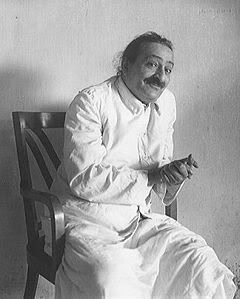Last night, in memory of a Friend who died suddenly, shockingly earlier in the week, we held a Memorial Service in his memory among those who knew him best. (Quakers do not use the word “funeral”) One Friend in attendance noted that, in addition to the worship, there is a certain group therapy aspect present. I agree. Yet, I think this is quite understandable and necessary. It’s a part of the grieving process. Each of us manages coming to terms with tragedy in different ways, but there is also something very human present that augments the purely religious aspect of the event.
Tag: silence
Jul 30 2008
Silence
Meher Baba lived and traveled in company with a circle of close disciples whom he termed his “mandali” (Sanskrit for ‘circle’), both men and women from whom he demanded absolute obedience. He and his mandali voluntarily assumed a life of extreme simplicity. From 1925 to the end of his life, Meher Baba remained silent, communicating by means of an alphabet board or by gesture. Meher Baba spent long periods in seclusion, often fasting, but he would intersperse these periods with wide-ranging travels, public gatherings, and works of charity, including working with lepers, the poor, and the mad. He gave many discourses, which have been collected by his followers.
Why did Meher Baba maintain silence? He wrote:
Man’s inability to live God’s words makes the Avatar’s teaching a mockery. Instead of practicing the compassion he taught, man has waged wars in his name. Instead of living the humility, purity, and truth of his words, man has given way to hatred, greed, and violence. Because man has been deaf to the principles and precepts laid down by God in the past, in this present Avataric form, I observe silence.
Hmmm.
Which brings me to the book and movie The Diving Bell and the Butterfly:
On December 8, 1995, Elle magazine editor-in-chief Bauby suffered a stroke and lapsed into a coma. He awoke 20 days later, mentally aware of his surroundings but physically paralyzed with the exception of some movement in his head and left eye. The entire book [The Diving Bell And The Butterfly] was written by Bauby blinking his left eyelid, in July and August of 1996. A transcriber repeatedly recited a French language frequency-ordered alphabet (E S A R I N T U L etc.), until Bauby blinked to choose the next letter. The book took about 200,000 blinks to write and each word took approximately two minutes. The book also chronicles everyday events and what they are like for a person with locked-in syndrome. These events include playing at the beach with his family, getting a bath, and meeting visitors. The French edition of the book was published in March, 1997. It received excellent reviews and sold 150,000 copies in the first week and went on to become a number one bestseller across Europe. Ten days after the book was published, Bauby died of pneumonia

